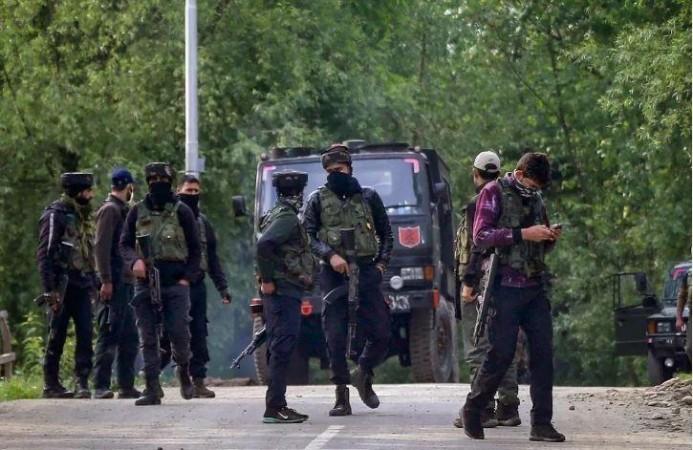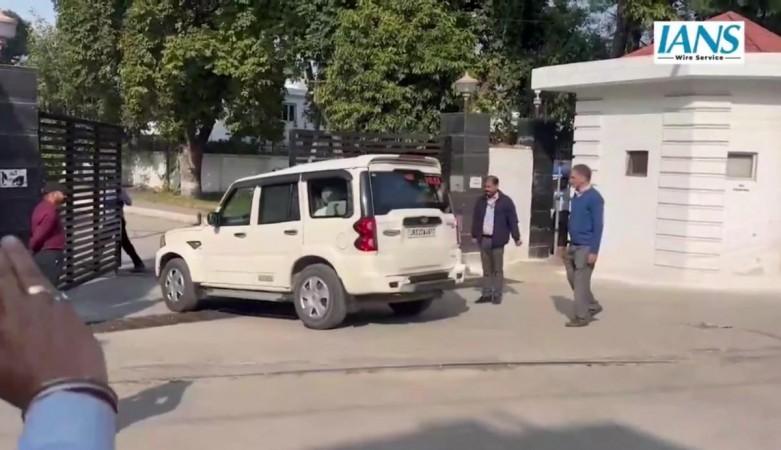
In a renewed crackdown on terror networks in the Kashmir Valley, security forces have conducted nine major anti-terror operations in the first two weeks of November, neutralizing a total of eight terrorists.
Five of these were identified as foreign nationals, primarily of Pakistani origin, highlighting the continued influence and infiltration of cross-border elements in the region's unrest.
This series of successful operations reflects a focused approach by security agencies to tackle insurgency, protect civilians, and restore peace across Jammu and Kashmir.
Counter-terror activities intensified after Unified Headquarters meeting
The escalation in counter-terror activities follows a high-level Unified Headquarters meeting held in Srinagar on October 24, presided over by Lieutenant Governor Manoj Sinha.
Senior officials, including Lieutenant General ML Suchindra, General Officer Commanding-in-Chief of the Army's Northern Command, and Jammu and Kashmir Director General of Police (DGP) Nalin Prabhat, were among the key figures present.

During the meeting, LG Sinha empowered the leadership of the security forces with the autonomy to execute decisive, independent operations, aimed at rooting out the terror networks and reducing violence in the region.
Rising threats amid winter infiltration
With winter now setting in, security experts and intelligence reports indicate that attempts at infiltration from Pakistan are likely to intensify. Snowfall in higher altitudes will soon block mountain passes, making it more challenging for terrorists to cross later in the season, spurring a rush in attempts to infiltrate before severe winter conditions close traditional routes.
Additionally, terrorists who previously infiltrated and were hiding in remote, mountainous areas are now moving towards lower, more populated regions. This shift in movement is believed to be driven by harsher winter weather and increased surveillance in higher terrains, forcing terrorists into lower areas where they may attempt to regroup or strike before further movement becomes restricted.
Increased surveillance and tightening control over OGW networks
A senior official from the Jammu and Kashmir Police commented on the intensified operations:
"Our efforts to dismantle not only the terrorist networks but also the Over Ground Worker (OGW) ecosystem that supports them have brought significant results. In recent weeks, we have continued to tighten our grip, restricting their movement, and the effects are visible."
This coordinated effort to disrupt the OGW network aims to dismantle logistical support that facilitates terrorists' movements and operations. The crackdown on OGWs, individuals who provide shelter, transportation, or logistical support to terrorists, has been integral to the recent successes in counter-terror operations. According to security analysts, choking this support network limits the mobility and operational freedom of terrorist groups across the Valley.
The operations conducted in November have been widespread, covering key areas across North, Central, and South Kashmir. Each encounter marks a significant step in the security forces' mission to stabilize the region and prevent terror elements from regaining a foothold.
- November 2: Security forces successfully neutralized a top Lashkar-e-Taiba (LeT) commander in an encounter in Khanyar, Srinagar. During the same day, two additional terrorists were killed in another encounter in Shangus, Anantnag.
- November 5: An encounter in Bandipora, North Kashmir, led to the elimination of one terrorist. Bandipora has been a focal area in anti-terror operations due to its strategic location, which has been exploited by infiltrators in the past.
- November 6: Security forces killed one terrorist in Lolab, Kupwara district, North Kashmir. Lolab Valley is a known corridor for infiltration from the Line of Control (LoC) and has witnessed an increase in the presence of terrorists.
- November 8: Two terrorists were neutralized in an intense operation in Sagipora, Sopore, Baramulla district. Sopore is an area with a long history of insurgency-related activities, making it a strategic location for anti-terror operations.
- November 9: Security forces conducted another successful operation in the Rampura Rajpura area of Sopore, Baramulla, resulting in the death of one terrorist.
- November 10: An encounter in the Zabarwan forest area in Ishwar Nishat, Srinagar, led to the containment of potential terror threats close to Srinagar's urban population.
- November 12: Security forces engaged terrorists in Nagmarg, Bandipora, following intelligence reports of terrorists' movement in the area.
- November 13: An encounter in Badimarg, Kulgam district, South Kashmir, concluded with security forces maintaining control over the region amid potential insurgent activity.
Ongoing mission to secure Kashmir
Security forces in Jammu and Kashmir remain on high alert as they continue their operations across the region. The recent spate of encounters reflects a larger mission to address both immediate terror threats and underlying networks that sustain them. The intelligence-led approach aims to preemptively counter terror plots, safeguard civilian areas, and maintain stability across the Valley.
Increased focus is also being placed on dismantling the Over Ground Worker networks and intercepting financial and logistical support systems. According to security agencies, continuing these efforts will be crucial to reducing terror-related incidents in the longer term. Authorities are committed to proactive engagement, with a particular focus on border areas and known infiltration routes, as well as the development of infrastructure to enhance intelligence gathering and response capabilities.
The series of successful operations and tightened security measures are part of a larger strategy to curtail terrorism in Jammu and Kashmir, improve the quality of life for residents, and pave the way for a safer, more stable future in the Valley.


![Miss Universe 2024: India's Rhea Singha slayed swimsuit round but failed to reach Top 12 [Watch] Miss Universe 2024: India's Rhea Singha slayed swimsuit round but failed to reach Top 12 [Watch]](https://data1.ibtimes.co.in/en/full/806361/miss-universe-2024-indias-rhea-singha-slayed-swimsuit-round-failed-reach-top-12-watch.jpg?w=220&h=135&l=50&t=40)



![Miss Universe 2024: India's Rhea Singha slayed swimsuit round but failed to reach Top 12 [Watch]](https://data1.ibtimes.co.in/en/full/806361/miss-universe-2024-indias-rhea-singha-slayed-swimsuit-round-failed-reach-top-12-watch.jpg?w=220&h=135)


